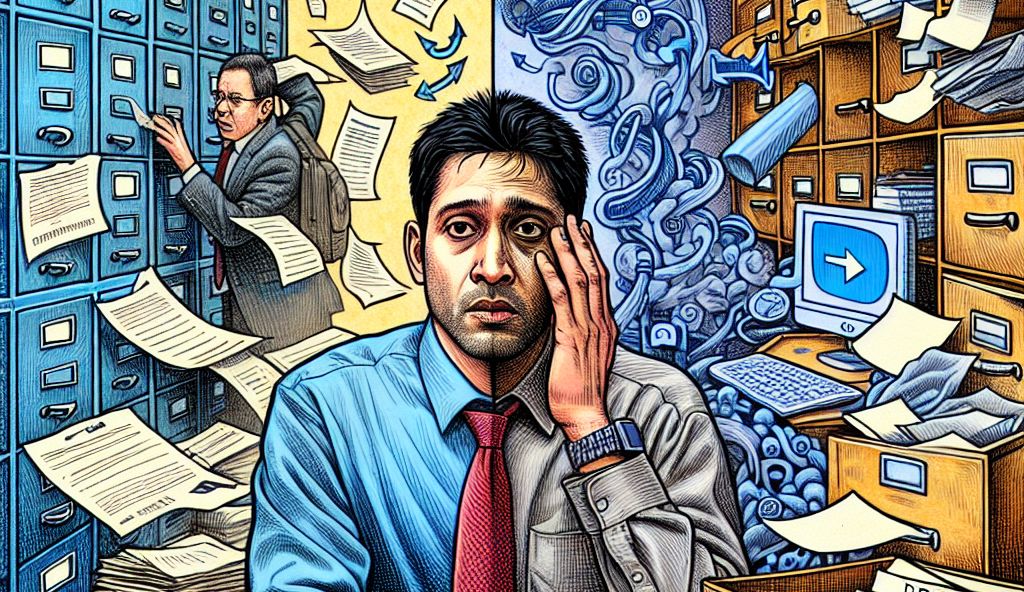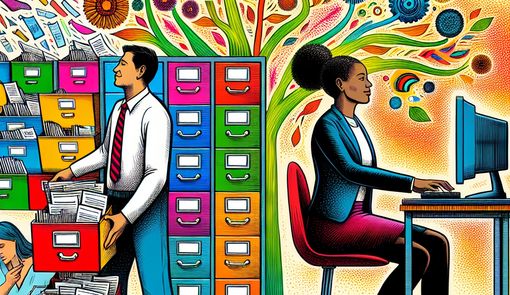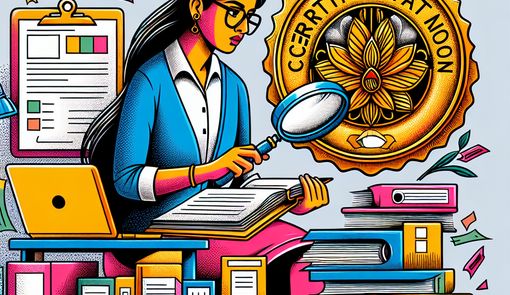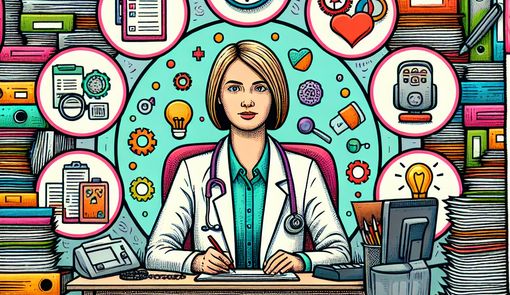The Digital Shift: How Technology is Changing the Role of Medical Records Clerks

The field of medical records management is undergoing a significant transformation, largely driven by advancements in technology. As digital systems become more prevalent, the role of medical records clerks is changing in ways that require new skills, perspectives, and approaches to their work. This transformation is not just impacting the day-to-day tasks of these professionals but is also reshaping the future of healthcare information management. In this in-depth exploration, we'll look at how technology is altering the landscape for medical records clerks and what the implications are for those working within this critical sector of healthcare.
The Evolution of Medical Records Management
Medical records management has traditionally involved a significant amount of manual labor, with clerks responsible for collecting, organizing, and maintaining paper-based patient records. This process was not only time-consuming but also prone to human error. The shift towards Electronic Health Records (EHR) and other digital platforms is streamlining these processes, ensuring greater accuracy, and providing easier access to patient information.
Implementing EHR systems has led to a considerable reduction in paperwork, allowing medical records clerks to focus more on quality control and data analysis tasks. Digitization has enabled comprehensive patient histories to be stored in a manner that is both secure and quickly retrievable. The immediate access to patient data aids in clinical decision-making, improving overall healthcare delivery.
The Impact of Digitization on Roles and Responsibilities
With the advent of EHR systems, the job description of medical records clerks is evolving. The digital shift requires clerks to be proficient in various software applications and platforms used for managing and analyzing patient data. Their role has expanded to include tasks such as data entry, scanning of documents, coding diagnoses and treatments, and ensuring that records are kept in compliance with healthcare regulations and privacy laws.
Medical records clerks are now expected to possess a stronger foundation in IT and data management as they interact with more advanced systems on a daily basis. In many cases, clerks are taking on new responsibilities such as assisting with systems administration, troubleshooting technology issues, and providing technical support to other healthcare staff.
Navigating Privacy and Security Concerns
As medical records become digitized, protecting patient privacy and ensuring the security of data has become a top priority. Medical records clerks must be trained in HIPAA compliance and other relevant legislation. They are often on the front lines of identifying and preventing unauthorized access to sensitive patient information. In this digital age, clerks must not only maintain confidentiality but also be vigilant about cybersecurity threats that can compromise patient data.
Clerks are tasked with maintaining the integrity of patient information through regular audits and by following stringent data protection protocols. Their role now includes staying up to date with the latest security practices and participating in ongoing training to mitigate risks associated with digital record-keeping.
Adapting to New Technologies and Workflows
Technological innovations continue to introduce new tools and platforms into the realm of medical records management. Medical records clerks must be adaptable and ready to learn as they encounter systems powered by artificial intelligence, machine learning, and blockchain technology. These technologies are poised to further revolutionize the management of healthcare data by improving the speed and accuracy of processes like coding and billing, and by offering new ways to secure patient records.
Clerks must be able to integrate new technologies into their workflow and collaborate with IT professionals to optimize the use of these tools. The adoption of telemedicine and remote patient monitoring tools also necessitates a reassessment of how patient data is collected and stored, possibly requiring additional training for clerks to handle these emerging sources of healthcare information.
The Growing Importance of Data Analytics
Beyond the traditional scope of record-keeping, the role of medical records clerks now increasingly involves data analytics. Being able to interpret and utilize large volumes of healthcare data is becoming a valuable skill. This analytical aspect enables clerks to contribute to research, public health initiatives, and policy-making by providing insights drawn from aggregated patient data.
With the power of data analytics, medical records clerks can help identify trends, track epidemiological patterns, and support healthcare facilities in achieving better patient outcomes. As the demand for data-driven decision-making in healthcare rises, clerks who are proficient in data analytics can play a more strategic role within their organizations.
Conclusion
The digital shift in medical records management is inevitable and continuously advancing. Medical records clerks are finding themselves at the intersection of healthcare and technology, where their evolving roles involve navigating new systems, safeguarding data privacy, adapting to innovative workflows, and leveraging analytical tools. To stay ahead of the curve, clerks must be proactive in acquiring the necessary technical and analytical skills, and open to the ongoing learning that the digital transformation demands. This pivotal change holds the promise of not only enhancing the management of medical records but also contributing to a more efficient, precise, and insightful healthcare system.
Frequently Asked Questions
1. How has technology changed the role of medical records clerks?
Technology has significantly transformed the role of medical records clerks by shifting from manual paper-based processes to digital systems such as Electronic Health Records (EHR). This change has led to streamlined processes, greater accuracy, and improved access to patient information.
2. What new skills are required for medical records clerks in the digital age?
In the digital age, medical records clerks need to be proficient in various software applications, data management, IT, and cybersecurity. They are also expected to adapt to new technologies like artificial intelligence and blockchain that are being integrated into healthcare data management.
3. How do medical records clerks ensure patient privacy and data security?
Medical records clerks ensure patient privacy and data security by adhering to HIPAA compliance, following data protection protocols, and staying updated on cybersecurity practices. They play a crucial role in preventing unauthorized access to sensitive patient information.
4. What is the impact of data analytics on the role of medical records clerks?
Data analytics is becoming increasingly important for medical records clerks as it allows them to interpret healthcare data, identify trends, and contribute to research and policy-making. Proficiency in data analytics enables clerks to play a more strategic role within healthcare organizations.
5. How can medical records clerks adapt to new technologies and workflows?
To adapt to new technologies and workflows, medical records clerks should be open to learning, collaborate with IT professionals, and participate in ongoing training. They need to integrate emerging technologies like telemedicine and remote patient monitoring into their workflow effectively.
6. What is the future outlook for medical records clerks in the evolving healthcare landscape?
The future outlook for medical records clerks is promising as they continue to play a crucial role in the digital transformation of healthcare. With the increasing importance of data analytics and technology in healthcare management, clerks have the opportunity to contribute significantly to improving patient outcomes and healthcare delivery.
Further Resources
For readers interested in exploring the evolving landscape of medical records management and the impact of technology on healthcare information systems, the following resources provide valuable insights and opportunities for further learning:
- HealthIT.gov - Electronic Health Records Overview: A comprehensive guide to understanding Electronic Health Records (EHR) and their implementation in healthcare settings.
- American Health Information Management Association (AHIMA): AHIMA offers a range of resources, including webinars, white papers, and certification programs, to stay updated on the latest trends in health information management.
- Healthcare Information and Management Systems Society (HIMSS): HIMSS provides industry insights, research papers, and educational events focused on healthcare technology and digital transformation.
- Journal of AHIMA: Access the latest articles and case studies in health information management, including topics on data analytics, privacy, and security.
- Centers for Medicare & Medicaid Services (CMS) - HIPAA: Stay informed about HIPAA regulations and compliance requirements through resources provided by CMS.
- Health Data Management: Explore news and insights on data-driven healthcare, including articles on artificial intelligence, machine learning, and data analytics in the medical field.
- Association of Medical Directors of Information Systems (AMDIS): AMDIS offers networking opportunities and educational resources for healthcare IT professionals interested in enhancing their skills and knowledge.
- The Office of the National Coordinator for Health Information Technology (ONC): Learn about the latest initiatives and standards in health information technology from the ONC, a federal agency focused on advancing healthcare IT.
These resources cover a range of topics, from electronic health records and data security to emerging technologies and industry best practices. Whether you are a seasoned medical records clerk looking to expand your expertise or a healthcare professional interested in the intersection of technology and patient care, delving into these resources can provide valuable insights and support your professional development in this rapidly evolving field.






